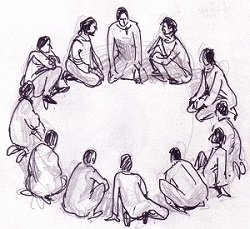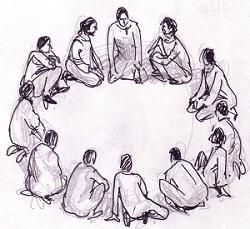

“We give thanks to God always for all of you” (1 Thessalonians 1:2).
1 Thess 1:1-5, 8b-10; Matt 23:13-22
Jesus confronts the hypocrisy of the scribes and Pharisees because they are using their official roles to complicate people’s path to God. They have turned the basic commandment of love into a maze of rules and rituals they control and profit from. They present themselves as spiritual guides, yet they block access and obscure the divine presence. They reduce religion to magical thinking and sacred objects and formulas to gain favor with God: Touch the gold of the temple or swear by the altar and your prayer will be answered. Jesus calls them blind teachers without direct experience of what is truly holy.
Tourists visit Rome and other famous shrines and come home loaded down with souvenirs, blessed rosaries, statues, relics, scapulars, and holy water. While these things serve as reminders and prompts to prayer and spiritual habits, they are no substitute for a personal relationship with God. Jesus came to reveal God as always available to everyone, always merciful and forgiving. He was indignant when he witnessed religion for sale or leaders obstructing direct access to God’s unconditional love.
St. Paul and his companions must have found great openness to the Gospel in Thessalonica. His letters to the Christian community there reflect deep faith. Their religious lives were not just a matter of words, but deep conviction expressed in love and service. Their reputation had spread far and wide, and Paul sees them as a model for the churches he is establishing with his missionary preaching and visits.
These early faith communities were yet uninfected by problems that beset other places like Antioch and Corinth, where infighting and rivalry weakened the witness of the Gospel that Paul praised in the Thessalonians. They were motivated by a keen longing for the Parousia, and even when this was delayed and some of their members began to die, Paul encourages them to keep faith in God’s promise of risen life.
Paul’s two letters to the Thessalonians are among his first epistles, and they provide a window into the first generation of Gentile converts. The primitive churches they formed are the ancestral foundation of our own faith communities. Strong parishes today exhibit some of the same qualities the first Christians showed: Active love and service flowing from sound teaching, good liturgy and sacramental practice, a healthy devotional life. Most of all, they possessed a culture of hope and joy that reveals the presence of the Holy Spirit. Many of our parishes are named for some of these first Christians. They are part of the “cloud of witnesses” (Heb 12:1) who inspire the church today.
Advertisement








